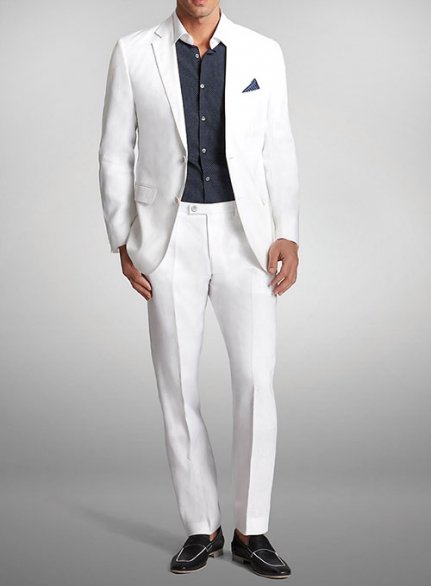Cotton and linen are two of the most common materials used in the construction of suits. Whether you're searching for a two-piece or three-piece suit, you'll probably come across these materials. Millions of men across the world wear cotton and linen suits on a regular basis.
To the unsuspecting eye, cotton and linen suit look the same. They both have a naturally soft appearance, resulting in a similar style. Because they are different materials, though, cotton and linen suits aren't identical to each other. By understanding how they differ, you'll be able to choose the perfect suit for your needs.
What Is a Cotton Suit?
A cotton suit is a type of men's suit that's made of cotton. Cotton, of course, is the world's most commonly used textile. Research shows that approximately 25 million tons of the fluffy white material is produced globally each year. While cotton is used for thousands of applications, it's frequently used in the production of garments, including two-piece and three-piece suits.
Cotton is a textile consisting of the organic protective shell in cotton plants. Cotton plants have seeds within the middle of the stem. Surrounding these seeds is cotton. Farmers harvest this cotton material, which they sell to various companies. Cotton suits consist of trousers, a jacket -- and in the case of three-piece suits, an added waistcoat -- that are made of this cotton material.
What Is a Linen Suit?
A linen suit, on the other hand, is a type of men's suit that's made of linen. Linen isn't the same as cotton. It may look like cotton from afar, but it's a completely different material with its own unique properties and characteristics.
Both cotton and linen are organic materials, and they are both derived from plants. While cotton comes from cotton plants, though, linen comes from flax plants. Flax plants -- the same plants that produce flax seeds -- contain a soft and fluffy material. This material is harvested and used in the production of garments like shirts, trousers and men's suits.
Benefits of Wearing a Cotton Suit
Because they are different materials, cotton and linen suits offer different benefits. Cotton suits, for instance, often cost less linen suits This is because cotton is the world's most commonly used textile. More cotton is produced annually than another textile. With such a large supply of the material, cotton suits are inexpensive. If looking to buy a new suit but have a limited budget, you may want to choose a cotton suit.
Both cotton suits and linen suits are lightweight. When compared to corduroy, wool and other common suit materials, they weigh less. With that said, cotton suits are typically lighter than their linen counterparts.
We can't talk about the benefits of wearing a cotton suit without mentioning softness. Cotton suits are super-soft to the touch. After all, they are made of the fluffy organic material that encases cotton seeds. With a cotton suit, you don't have to worry about your trousers, jacket or waistcoat causing discomfort. You can wear a cotton suit for eight or more hours a day without experiencing any discomfort thanks to the soft and fluffy properties of cotton.
Cotton is also hypoallergenic. What does this mean exactly? Hypoallergenic materials are textiles that don't trigger skin allergies. If you have a skin allergy, certain materials may cause you to break out in a rash or hives. Cotton is hypoallergenic, so it's safe for people with skin allergies.

Benefits of Wearing a Linen Suit
Linen suits offer a plethora of benefits as well. You might be surprised to learn that they are typically stronger and more durable than cotton suits. High-quality cotton suits are strong and durable as well. When compared to linen suits, they are slightly weaker.
Linen suits are undeniably strong and durable. You don't have to worry about your linen suit sustaining damage. Assuming it's made of pure linen, it will hold under stress and pressure without succumbing to damage.
Another benefit of wearing a linen suit is moisture protection. Cotton and linen are both capable of absorbing, as well as holding, moisture. Linen, however, absorbs less moisture than cotton. And because linen absorbs less moisture than cotton, linen suits are a popular choice for beach weddings and other occasions where heat is a problem.
Like cotton, linen is a hypoallergenic material. Therefore, wearing a linen suit won't trigger an allergic reaction. If you have a skin allergy, you can wear either a cotton suit or a linen suit without fear of it causing an allergic reaction. The same can't be said for other common suit materials, many of which aren't hypoallergic.
Another similarity between cotton and linen suits lies in their softness. Both types of suits are incredibly soft. Some people assume that cotton suits are softener than linen, but this isn't necessarily true. They both have a similar level of softness, which is one of the reasons why they've become so popular.
On the other hand, linen suits are less susceptible to pilling than cotton suits. Pilling is a phenomenon in which fuzzballs form on the surface of a garment. When a garment sheds some of its excess material, these fuzzballs or pills may form on the surface. Linen suits are less likely to develop pills than cotton suits. As a result, linen suits are easier to clean and maintain than cotton suits.
Choosing Between a Cotton and Linen Suit
You can't go wrong with either a cotton or linen suit. There's a reason why they are the most common types of suits. Cotton and linen are soft and fluffy textiles that offer the utmost comfort. At the same time, they are hypoallergenic, so they won't cause allergic reactions with your skin.
If you're going to buy a new suit, though, you should learn the differences between cotton and linen. Only then can make an educated decision regarding which type is right for you.


